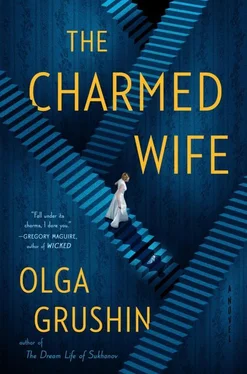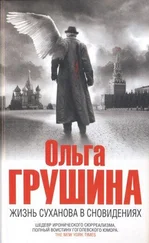Now, I am not so sure.
“Gloria, what did you have against my marriage?” I blurt out when she pauses to take a sip of her martini.
She raises one elegant eyebrow. There is something of a bird of prey in the spare grace of her movements.
“Let’s just say, I did not think you two were a suitable match.” She waves her hand, and I follow the bright red trajectory of her glittering nails. A baby-faced waitress materializes by our table. “Another martini, my dear,” Gloria says, lightly touching her finger to the waitress’s bare arm, then shifts her gaze back to me. “You were too young. Too young to know yourself properly. Too young to know your fiancé properly. When I was that age, I didn’t even know what I liked.”
“What you liked ?”
The waitress sails back across the black-and-white room with the new martini, swinging her hips, and a dozen more waitresses float through the mirrors on all sides of us, their eyes obliquely meeting the eyes of Gloria’s manifold reflections.
“Shortly after your wedding,” Gloria says, raising her fresh drink to her lips, “I met someone. A prince much like yours. Handsome, rich, all the right parts in all the right places. He wanted to marry me. But something felt wrong, so I just kept saying, ‘Perhaps,’ and ‘Let’s talk about it next month,’ and ‘Maybe after I’m done with my studies next year,’ and ‘Let me just settle into my job first.’ Eventually he got angry, tricked me into a tower, and, once I was inside, walled the door shut. For weeks, I sat by the only window, high off the ground, and his servants used pulleys to deliver my food so I wouldn’t starve, but I was allowed to talk to no one, to see no one—and every Sunday, right as clockwork, he would come to my window and shout: ‘Will you marry me now?’ And then I was angry, too, so there were no more ‘Maybe’ and ‘Later.’ I would just scream ‘No!’ down at him, and he would stride away in a huff.”
She pats her dramatic red mouth with a napkin, and immediately the waitress appears by her elbow. “I’ll bring you a fresh one,” a dozen waitresses promise breathlessly in a dozen mirrors. We wait for her to deposit another white paper square on the table, wait for her to walk away.
“Gloria, I had no idea… But you didn’t marry him, did you?”
“Of course not. The very thought!”
“How, then, did you get out?”
“Well. Since you ask. One of the prince’s servants and I fell in love. We figured out a way to see each other. Remember when my hair was really long? If I let it down from the tower window, it would touch the ground, and she could climb up to me. In time, she managed to smuggle in a rope ladder, and I escaped. We escaped together.”
“Sorry.” It has taken a few moments to filter through. “She?”
Gloria smiles at me, indulgently.
“All part of growing up, baby girl,” she says, enunciating as though speaking to a child. “Figuring out what you like. What you are. Which—in spite of being almost forty years old, you know—is something you still need to do, in my opinion.”
“Oh.” I feel as though I have accidentally walked in on my sister naked, so I hasten to skip over her comment. “And then… then you lived happily ever after?”
She drinks the last of the martini, calls out, “Check, please!” and turns her level gaze back upon me. “Sometimes, I just don’t know about you. This isn’t some fucking fairy tale. Oh, I suppose we had a few good years. Eventually she left me for another woman. An artist I myself had discovered, as it happened, which wasn’t pretty. That’s when I cut off my hair. In the end, though, I like it better this way.”
I do not know whether she means her hairstyle or her life, and I am feeling too embarrassed to ask, so, to say something, anything, I tell her: “I guess all this happened after your mother’s funeral? Your hair was still long then.”
And now she is looking at me funny, and all at once uncomfortable, I lower my eyes, which is when I see the napkin the waitress brought her still lying on the table, and it is not a fresh napkin at all: the paper square is visibly smudged with the red imprint of Gloria’s kiss.
“Hey, she gave you back your own used napkin,” I mumble.
“Indeed?” Gloria turns it over. A telephone number is scrawled in one corner. “Yes, I rather thought so.” A look of mild yet unmistakable interest flickers through her eyes. “Listen, it was good seeing you. I’ll go settle the bill now.”
She stands up, tall, elegant, collected, and looks down at me.
“Everything will be all right, little sister. Or maybe it won’t be, in which case it will be something else, something new, which may turn out even better once the dust settles. Mel and I are here for you.” She touches my cheek, briefly. “But you really need to stop with those Freudian slips. She was your mother, too.”
I watch her moving away, as though in slow motion, into the black-and-white geometry of the room, the assured clicking of her heels slicing cleanly through the clanking of silverware, through the muttering of other diners’ conversations. There is a sound, a nagging, repetitive sound, like the buzzing of a very loud, angry bee. People at the neighboring tables turn their heads to glare at me, and snapping out of my reverie, I reach for my purse and fish out my cell phone.
It is my lawyer.
“Are you anywhere near my office?” she says. “We need to talk.”
And so, half an hour later, still reeling, I sit in a glass-walled office high above Manhattan, across the desk from my lawyer, who is telling me that her private investigator has turned up nothing, nothing at all, for my husband is clever and careful, if not actually clean, whereas the evidence against me is solid. There is the family doctor’s testimony on the subjects of my depression and my propensity for self-medication and self-harm, there is the recent photograph of me inebriated in the park, there are maids willing to confirm the abundance of mouse droppings and ill-smelling weeds all over my former quarters, and to corroborate my erratic habits and odd behavior, such as my staring into a handheld mirror for hours on end or not speaking for months at a time—and, given the facts, the custody hearing is not likely to go my way. Financially, too, everything my husband owns is either part of his inheritance, to which I have no right, or else squirreled away in offshore accounts and shell companies, equally out of reach, and I have next to no claim on absolutely anything, which she has been trying to get through to me for days, for weeks, but do I listen?
And at last, I am beginning to listen.
“There is the Fifth Avenue apartment, though,” I say. “Half of it should be mine. I don’t want to live there, but we can sell it and split the proceeds. It would be more than enough to buy a modest place for me and the kids.”
She snaps my file closed and sits back, exasperated.
“I’ve explained. Over and over again. It belonged to your father-in-law. Roland got it through his inheritance. It’s nonmarital property.”
On the streets below, cars honk, people walk, vendors hawk pretzels and newspapers—life as usual, life as I have always known it.
As Gwen’s words sink in, I force myself to breathe.
“But the house on Martha’s Vineyard?”
“The same.”
“And the furnishings? The artwork? The royal treasury?”
A lonely siren cries somewhere far away. I am starting to panic.
“The same.”
“But surely, half of my husband’s income—”
“Half of it would be yours, yes. If your husband had any income. As it happens, though, he draws no actual salary, he just runs his late father’s company.” I open my mouth. “Which is his inheritance, and thus nonmarital property.” I close my mouth. “On the other hand, Roland’s lawyers have just informed me that your own income since your separation—all the money you’ve earned from your cleaning business, which appears to be doing quite well— is subject to the marital division, so they are now demanding half of everything you’ve made in the past six months.”
Читать дальше












